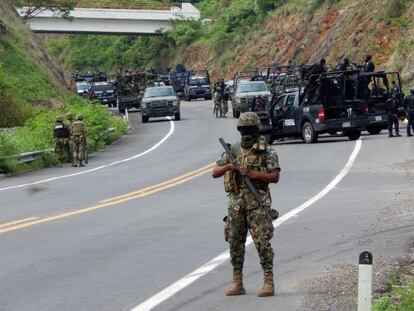Surge in violence in Michoacán puts Peña Nieto’s security strategy to the test
At least 22 people were killed in ambushes across the state in one day PRI government believes military crackdowns are to blame for incidents


The Mexican state of Michoacán was the scene Tuesday of the worst violence to have taken place in a single day in recent months. Authorities said that at least 22 people were killed in different gun battles between police and organized crime gangs throughout the state.
Mexico’s National Security Commission reported six attacks against federal police by gang members in different locations. Among the dead are two members of the police force; 15 other officers were seriously wounded.
Authorities said that “the planned attacks,” which were carried out by “individuals with assault weapons,” took place on the Tumbiscatío-Arteaga road, near the town of Puerto el Mamey in the Infiernillo community, and in the town of El Carrizo.
These recent confrontations have posed a challenged to the young government of President Enrique Peña Nieto and the security strategy he recently unveiled. In May, the government embarked on its first major operation by sending out troops to 19 municipalities across Michoacán, where citizens have found themselves caught in the middle of bloody battles between vigilante groups and drug cartels.
The Institutional Revolutionary Party (PRI) government insists that the increase in violence over recent weeks in the region is due to the crackdowns by authorities against criminals.
“We are not backing off and, of course, we will continue our work"
“We are not backing off and, of course, we will continue our work, in which we have been very successful in recovering a lot of territory,” said Miguel Ángel Osorio Chong, Mexico’s interior chief. He made his remarks following a meeting with US Homeland Security Secretary Janet Napolitano on Tuesday.
Osorio Chong pointed out that the continued police and military presence will guarantee that law and order is reestablished in the region – a similar strategy that was undertaken by Peña Nieto’s predecessor, Felipe Calderón, during his six years in office.
Another violent incident that took place – which will also put the government’s security strategy to the test – occurred Monday in Los Reyes municipality. Five people were killed and seven others were wounded when an unknown armed group of men fired at demonstrators outside the local town hall. The demonstration was held to protest the alleged links between the local police force and the drug trafficking cartel, Los Caballeros Templarios.
Prosecutors in Michoacán said that the protest, in which some 200 people participated, was organized by a local vigilante force. But authorities are unsure whether the demonstrators were actually citizens from Los Reyes or were members of the vigilante force. Of the five victims, one was a local municipal police officer and another a citizen who had just emerged from a bank.
Local vigilantes have organized themselves after scores of extortions and threats have been made by the Los Caballeros Templarios cartel against citizens and businesses. Splitting off from the Michoacana Family cartel in 2010, Los Caballeros Templarios has become one of the most powerful drug organizations in the region. Its members have taken over large areas of the state and closed off districts to local authorities.
Despite the rash of violence in recent days, interim Governor Jesús Reyna maintains that law and order in the state are still intact. “These are criminal acts, and there are laws to investigate and punish. Governance is much stronger and is not at risk,” Reyna told the press recently.
Tu suscripción se está usando en otro dispositivo
¿Quieres añadir otro usuario a tu suscripción?
Si continúas leyendo en este dispositivo, no se podrá leer en el otro.
FlechaTu suscripción se está usando en otro dispositivo y solo puedes acceder a EL PAÍS desde un dispositivo a la vez.
Si quieres compartir tu cuenta, cambia tu suscripción a la modalidad Premium, así podrás añadir otro usuario. Cada uno accederá con su propia cuenta de email, lo que os permitirá personalizar vuestra experiencia en EL PAÍS.
¿Tienes una suscripción de empresa? Accede aquí para contratar más cuentas.
En el caso de no saber quién está usando tu cuenta, te recomendamos cambiar tu contraseña aquí.
Si decides continuar compartiendo tu cuenta, este mensaje se mostrará en tu dispositivo y en el de la otra persona que está usando tu cuenta de forma indefinida, afectando a tu experiencia de lectura. Puedes consultar aquí los términos y condiciones de la suscripción digital.








































